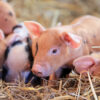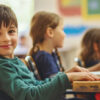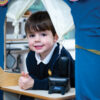Young children often take a dislike to maths. Burgess Hill Girls teacher Shelley Allen explains how parents can use everyday activities to turn a minus into a plus.
Whether it’s a child working out whether they have enough pocket money to buy a prized toy or an adult grappling with a recipe that uses ounces instead of metric measures, we all encounter mathematics in some form throughout our daily lives. It is a subject that can strike fear into the hearts of young and old, but the perception that “I can’t do maths” can be overcome.
As parents, we can help children to acquire the tools they need to tackle the mathematical concepts they encounter not only in the classroom but beyond the confines of a worksheet or exercise book, out there in the big wide world.
Children, particularly infants, have a very defined view that mathematics is something that happens in maths lessons. But by exposing them to the mathematics that is all around them they will be able to see the value of learning to ‘do’ maths and also accept that it is something that can be enjoyed.
Five ways to change your child’s mindset on maths:
1. On the hour: telling the time
You will almost certainly have checked the time during the day. Whether analogue or digital, this is an opportunity to talk to your child about what is happening and how long it is until the next event in the day.
2. Count it out: cards and board games
At preschool level and well beyond, traditional board and card games are a great way to introduce mathematical concept. In old favourites like Snakes and Ladders, a child is required to recognise that dots on a dice represent a number, count the number of spaces with their counter and consider which direction to travel on the board. A pack of playing cards can reinforce recognition of numbers up to 10 and the ways in which they can be represented. Junior versions of games such as Monopoly require children to count out money and begin to consider doubles as well as developing strategy and reasoning skills.
3. Coining it in: the value of money
The supermarket, or any other shop for that matter, is a fantastic source of mathematical investigation. For younger children, simply reading the price of an item on the shelf and comparing it with the price of another provides a real-world context for exploring greater and less. Older children can estimate the total price of the shopping using rounding and estimating to get a sensible answer, with perhaps even a prize for the closest! Product labels are full of information and encourage children to work out the best-value product by looking at the price by weight or volume. Contactless payment now means that money doesn’t even need to change hands at the till, but give children opportunities to use coins to count in twos, fives and tens, explore place-value including decimals and to investigate the ways in which different combinations can be added to make one amount. Older children can work out and check change given.
4. Measuring up: DIY
home improvements offer another great opportunity to access some real life maths.
From counting screws to measuring lengths for younger children to working out the area of a wall or floor to calculate the amount of paint or carpet needed for upper Key Stage 2, there are plenty of ways to enhance your child’s learning.
5. What’s cooking: sharing the cake!
Cooking of any sort requires counting, weighing and measuring. For older children it is a chance to explore ratio and proportion by doubling or halving mixtures or to convert between different units of measure, whether metric or imperial. It can also be a way to develop an understanding of fractions. Sharing pizza or cake is a way to explore anything from simple fractions such a halves and quarters to the more complex ideas of equivalence and comparison. In the classroom I find that any maths that involves chocolate is met with immense enthusiasm!
Shelley Allen is a KS1 Teacher and Junior School STEM Coordinator at Burgess Hill Girls











